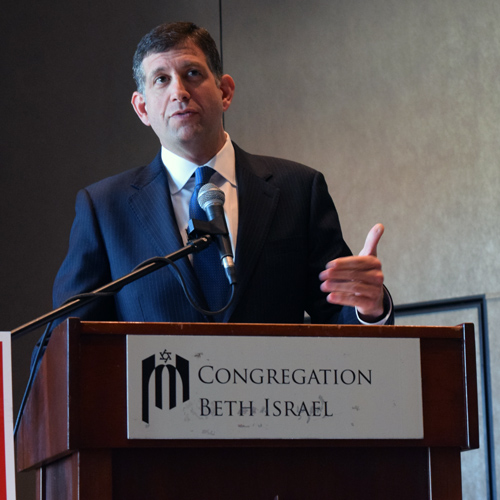
By Donald H. Harrison

SAN DIEGO – Neither the United States nor Israel should be intimidated by Palestinian predictions of violence if U.S. President Donald Trump follows through on his pledge to move the U.S. Embassy from Tel Aviv to Jerusalem, Sam Gundwerg, Israel’s consul general in Los Angeles, said Monday during a San Diego visit.
Speaking to religious and community leaders invited by the Jewish Federation to a luncheon at Congregation Beth Israel, Grundwerg said although relocation of the U.S. embassy would be “a painful pill” for the Palestinians, in the long run it will be to everyone’s benefit.
He said Palestinians need to understand that Israel and its capital in Jerusalem have been a reality for nearly 70 years, and that “correcting the situation on the ground” will ultimately be a step toward peace.
Raised in an Orthodox synagogue in Southern Florida before making aliyah to Israel, Grundwerg had served as executive director of the World Jewish Congress before becoming a diplomat for his adopted country of Israel.
Quizzed on settlements built in territory won from Jordan in the 1967 war, the consul general said the reason Israel took such exception to the recent United Nations Security Council resolution condemning settlements was because the resolution, in which the United States abstained, prejudged an issue that should be the subject of direct negotiations between the Israelis and the Palestinians.
He noted that Israel has shown in the past that it is “willing to make difficult decisions” — such as the historic withdrawals of Israeli communities from Sinai and Gaza– and said the presence of such communities beyond the pre-war 1967 lines needs to be understood as only one issue of many that need to be negotiated between the two sides.
He observed however that one should draw a distinction between settlement blocs built close to Jerusalem and “isolated outposts’” which, he said, “can lead to violence.”
Grundwerg suggested that from Israel’s standpoint, “there are two U.N.’s,” one in which voting is done by political blocs, often to Israel’s detriment, and the other, which meets in the corridors, where public adversaries reach private agreements with the Israelis.
Concerning the issue currently before the Knesset of private Palestinian land appropriated for settlements, as typified by the community known as Amona, Grundwerg said the issue is far more complicated than media accounts portray it. As a former practitioner of real estate law in Florida, he said the issues of private ownership in the disputed territories are complex, with a lack of laws to give clarity leaving the situation almost in a vacuum.
A questioner asked why Israel doesn’t take strong action against Bedouin Arabs in the Negev who encroach upon Israeli land. The consul-general responded that there are ongoing negotiations on this issue, but that if Israel were to take precipitous action, it would give ammunition to adversaries, including proponents of the Boycott, Divestment and Sanction (BDS) movement.
Rabbi Nadav Caine of Ner Tamid Synagogue in Poway, representing the non-Orthodox San Diego Rabbinical Association (SDRA) asked if there were any hopeful words for non-Orthodox movements in Israel. Grundwerg said that Prime Minister Benyamin Netanyahu is committed to establishing a venue at the Kotel for egalitarian religious services. He said although he is an Orthodox Jew himself, he too is frustrated over the situation under which Natan Sharansky brokered an agreement to this effect only to see it blocked in the Knesset.
Throughout his presentation on this, his first trip to San Diego since taking office about six months ago in Los Angeles, Grundwerg stressed that he wants to work with local communities to reinforce Israeli relevance in the lives of American Jews and the general population.
Israel is a leader in technology, water, cyber security, and fighting terror and this expertise is important to America generally, he said. However, there is a need to reach out to young Americans who either don’t know or care about Israel, and to find ways of engaging these young people.
*
Harrison is editor of San Diego Jewish World. He may be contacted via donald.harrison@sdjewishworld.com